source(google.com.pk)
Mexico Traditional Dress Biography
Traditional Mexican Clothing
Today, the vast majority of Mexicans dress in a modern, "global" style. But you can still find examples of more traditional Mexican clothing in the many indigenous villages and communities across the country. The best examples of pre-Hispanic clothing are found on women, since men typically wore very little clothing before the Spanish conquest.
Indigenous women dress in several layers. The first is the huipil, a long, sleeveless cloak that resembles a loose dress. Over the cloak, an indigenous woman might wear a quechquemitl, an intricately woven and decorated poncho that was worn exclusively by noblewomen and priests during the Aztec empire [source: Textile Museum]. In many indigenous communities, women wear an ankle-length wrapped skirt held in place by a sash. The final piece of traditional clothing is the rebozo, a length of cloth that wraps around the shoulders and doubles as a coat or baby carrier.
Indigenous men adopted European-style pants and shirts shortly after the Spanish conquest and haven’t strayed much from that uniform ever since. The most unique aspects of male clothing are the serape and the sombrero. The sarape is a multipurpose wool cape that became famous during Mexico’s many wars and armed conflicts during the 19th and early 20th centuries [source: México Desconocido]. The serape functions as a saddle blanket, a sleeping bag and an overcoat in cold or rainy weather. Today, the serape comes in wonderfully ornate designs representing the indigenous roots of the wearer.
The sombrero is an essential article for life in the hot Mexican countryside. The traditional indigenous sombrero is woven from reeds and doesn't have the broad rim of the more ceremonial sombrero charro used by Mariachi. Both indigenous men and women wear leather sandals, and their simple cotton or wool clothing is often embroidered with intricate, colorful patterns that reflect the particular style of the home community. Even the thickness and color of the lines on a rebozo can indicate a person's home village.
When talking about Mexican dresses, we need to say that there are years of tradition and cultural influence in the making. They are characterized for being special and unique garments, with designs according to the region they come from. Mexican embroidered dresses are an excellent portrait of Mexican culture.
Modern Mexican Traditional Dress
Mexican dresses simple design makes it especially popular during the summer and in warm climates. They are loose flowing, made of natural fibers, usually cotton, and embroidered with vibrant thread and beads with designs of flowers, animals, abstract figures or Mexican symbols. Women are lucky to have an awesome variety of Mexican dress styles.
Traditional Mexican Dresses are a true piece of art, handcrafted with traditional methods, which is why they are appreciated by people all around the world who prefer the comfort and beauty of an authentic garment.
Mexican Embroidered dresses have always been used as every day wear, not necessarily as an outfit for celebrations. However, today a sophisticated version of the dress is popular during the Cinco de Mayo holiday primarily in the Mexican state of Puebla and now more and more in the United States. You can also appreciate these popular dresses when watching typical Mexican dances.
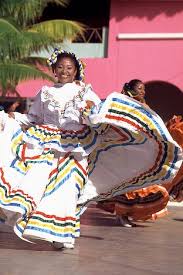

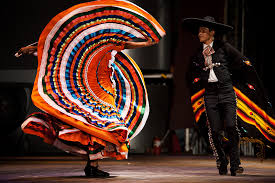
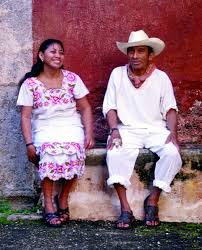
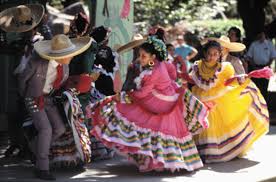
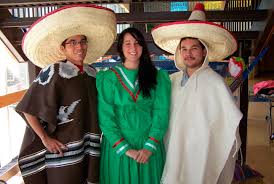
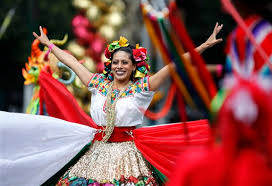
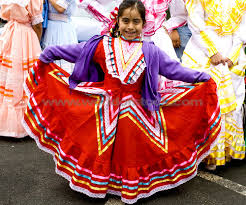
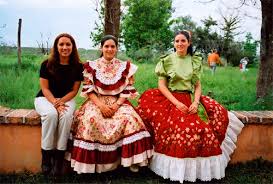

Mexico Traditional Dress Biography
Traditional Mexican Clothing
Today, the vast majority of Mexicans dress in a modern, "global" style. But you can still find examples of more traditional Mexican clothing in the many indigenous villages and communities across the country. The best examples of pre-Hispanic clothing are found on women, since men typically wore very little clothing before the Spanish conquest.
Indigenous women dress in several layers. The first is the huipil, a long, sleeveless cloak that resembles a loose dress. Over the cloak, an indigenous woman might wear a quechquemitl, an intricately woven and decorated poncho that was worn exclusively by noblewomen and priests during the Aztec empire [source: Textile Museum]. In many indigenous communities, women wear an ankle-length wrapped skirt held in place by a sash. The final piece of traditional clothing is the rebozo, a length of cloth that wraps around the shoulders and doubles as a coat or baby carrier.
Indigenous men adopted European-style pants and shirts shortly after the Spanish conquest and haven’t strayed much from that uniform ever since. The most unique aspects of male clothing are the serape and the sombrero. The sarape is a multipurpose wool cape that became famous during Mexico’s many wars and armed conflicts during the 19th and early 20th centuries [source: México Desconocido]. The serape functions as a saddle blanket, a sleeping bag and an overcoat in cold or rainy weather. Today, the serape comes in wonderfully ornate designs representing the indigenous roots of the wearer.
The sombrero is an essential article for life in the hot Mexican countryside. The traditional indigenous sombrero is woven from reeds and doesn't have the broad rim of the more ceremonial sombrero charro used by Mariachi. Both indigenous men and women wear leather sandals, and their simple cotton or wool clothing is often embroidered with intricate, colorful patterns that reflect the particular style of the home community. Even the thickness and color of the lines on a rebozo can indicate a person's home village.
When talking about Mexican dresses, we need to say that there are years of tradition and cultural influence in the making. They are characterized for being special and unique garments, with designs according to the region they come from. Mexican embroidered dresses are an excellent portrait of Mexican culture.
Modern Mexican Traditional Dress
Mexican dresses simple design makes it especially popular during the summer and in warm climates. They are loose flowing, made of natural fibers, usually cotton, and embroidered with vibrant thread and beads with designs of flowers, animals, abstract figures or Mexican symbols. Women are lucky to have an awesome variety of Mexican dress styles.
Traditional Mexican Dresses are a true piece of art, handcrafted with traditional methods, which is why they are appreciated by people all around the world who prefer the comfort and beauty of an authentic garment.
Mexican Embroidered dresses have always been used as every day wear, not necessarily as an outfit for celebrations. However, today a sophisticated version of the dress is popular during the Cinco de Mayo holiday primarily in the Mexican state of Puebla and now more and more in the United States. You can also appreciate these popular dresses when watching typical Mexican dances.
Mexico Traditional Dress
Mexico Traditional Dress
Mexico Traditional Dress
Mexico Traditional Dress
Mexico Traditional Dress
Mexico Traditional Dress
Mexico Traditional Dress
Mexico Traditional Dress
Mexico Traditional Dress
Mexico Traditional Dress
Mexico Traditional Dress
Beautiful blog for the beautiful culture thanks for sharing. kidoriman also provides you the best men's fashion.
ReplyDelete